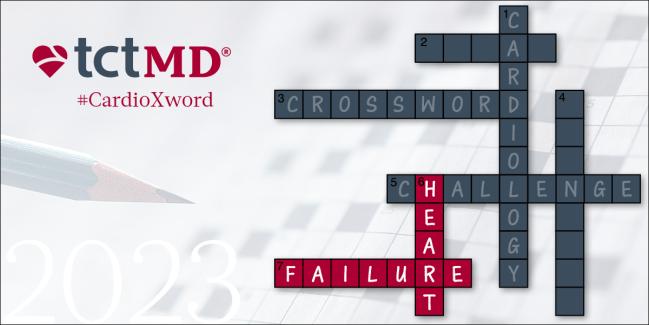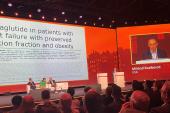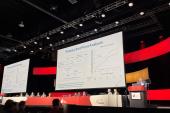Top Heart Failure News of 2023
Clinical trials in heart failure were smaller this year than last, and less positive, but many advances in cardiology had links to HF.

Heart failure (HF) has for several years dominated cardiology headlines, but 2023 offered fewer blockbusters and plenty of debate over how key clinical trial results should impact HF care.
Amid that slight dip in showstopping studies came the news that more than half of the 2023 fellowship positions in advanced heart failure and transplant cardiology (AHFTC; 9 Down) went unfilled. In response, heart failure leaders published a “road map” in the Journal of Cardiac Failure for revamping interest in their subspecialty. A subsequent survey offered some clues as to AHFTC’s waning appeal.
But a number of smaller trials will no doubt influence practice, with STEP-HFpEF (STEPHFPEF; 8 Down), in patients with heart failure with preserved ejection fraction, leading the pack. Presented by principal investigator Mikhail Kosiborod, MD (Saint Luke’s Mid America Heart Institute, Kansas City, MO), at the European Society of Cardiology (ESC) Congress 2023, this 529-patient trial showed that a once-weekly injection of the GLP-1 agonist, semaglutide (Wegovy; Novo Nordisk) significantly reduces HF-related symptoms and inflammatory markers, while also improving physical function.
Another notable positive—also presented at ESC 2023—was CASTLE-HTx showing that AF ablation (AFABLATION; 6 Across) is beneficial, even among patients with advanced heart failure who are being considered for heart transplantation or implantation of a left ventricular assist device (LVAD). In this small study, catheter ablation significantly reduced all-cause death, implantation of an LVAD, or urgent heart transplantation through a median follow-up of about 18 months.
Other eagerly awaited clinical trial results were met with disappointment, chief among them the HEART FID study of intravenous iron (IVIRON; 11 Across). Many had hoped this large, randomized, double-blind trial would deliver a conclusive win for intravenous iron supplementation in heart failure after IRONMAN came out negative last year. Instead, though iron repletion with ferric carboxymaltose was associated with numerically fewer deaths and HF hospitalizations and greater gains in 6-minute walk test, the trial failed to meet its primary endpoint.
Also disappointing, to some, was DAPA-MI (DAPAMI; 47 Across), testing dapagliflozin (Farxiga; AstraZeneca) in acute MI patients with either impaired LV function or Q-wave MI. As reported by TCTMD at the American Heart Association (AHA) 2023 Scientific Sessions, the SGLT2 inhibitor improved cardiometabolic outcomes in a win-ratio analysis that served as the trial’s revised primary endpoint but did not make a dent in CV deaths/heart failure hospitalizations—the trial’s original primary endpoint.
In terms of HF policy and practice, the ESC released comprehensive new cardiomyopathy guidelines across the full range of cardiomyopathy (CMY; 56 Down) genotypes. This first-of-its-kind document covered diagnostic and management strategies, imaging recommendations, and advancements in genetic testing, and it spanned hypertrophic, dilated, nondilated left ventricular, arrhythmogenic right ventricular, and restrictive CMY. In the US, meanwhile, lawmakers are tackling high drug prices through the Inflation Reduction Act (IRA; 11 Down) and a range of pricy heart failure medications are included on the list of agents earmarked for Medicare negotiations. Medicare patients on all four guideline-directed medication classes, for example, can expect to save about $1,000 per year, Micah Johnson, MD (Brigham and Women’s Hospital, Boston, MA), estimated to TCTMD.
The last heart failure clue to be included in this year’s Cardiology Crossword Challenge also appeared in our 2022 puzzle. In September, the world’s second living patient with end-stage heart failure was implanted with a heart from a genetically modified pig (PIG; 37 Across). Unfortunately, as University of Maryland Medical Center officials announced on Halloween, the recipient, Lawrence Faucette of Frederick, MD, died 6 weeks after the experimental transplant with an autopsy confirming transplant rejection.
What Else Made Waves in Heart Failure?
Speaking with TCTMD about the top heart failure news of the year, JCF Editor-in-Chief Robert Mentz, MD (Duke University Medical Center, Durham, NC), and Deputy Editor Anu Lala, MD (Icahn School of Medicine at Mount Sinai, New York, NY). listed STEP-HFpEF, CASTLE-HTx, and HEART-FID. The latter study, “we'd hoped would be the definitive trial to answer questions and provide greater clarity around IV iron and heart failure,” said Mentz, who led the trial. More answers may come from FAIR-HF2, due out next year, will have a more decisive answer, he added.
Several other items of research and policy news made Mentz’s top 10 list.
The ARIES-HCM3 trial, from AHA 2023, showed that dropping aspirin cuts strokes, bleeds, hospital stays in LVAD patients. “I think that was really impactful because it was an example where the data came out and within days, we actually changed our management for all of our LVAD patients,” Mentz said. “That, I think, was pretty exciting.”
PUSH AHF, a small trial out of the Netherlands released at ESC 2023, showed that using a natriuresis-guided approach to IV loop diuretic therapy—with intensification as needed—bumped up both natriuresis and diuresis, but did not have a significant impact on clinical outcomes at 180 days.
The Chinese QUEST trial, also presented at ESC 2023, showed that patients who had heart failure with reduced ejection fraction and took Qiliqiangxin, a traditional Chinese medicine comprised of 11 different plants, on top of guideline-directed medical therapy had a 22% reduction in death or heart failure hospitalization over 18 months as compared with placebo-treated patients. “That’s a provocative, large treatment effect,” said Mentz. “There was lots of discussion about it, [including] what does that mean for patients outside China?”
Lala, for whom STEP-HFpEF was this year’s standout alongside the much larger SELECT (34 Down) trial, called the GLP-1 agonists (GLP; 29 Across) “real game changers” in heart failure care. “We're evolving into a space that we're able to appreciate risk factors leading to HFpEF and recognizing the continuum across preventative measures and heart failure,” she said, “and understanding more about how treating symptomatic obesity is in large part treating HFpEF.”
Lala, referencing the 40% of fellowships in AHFTC that went unmatched in the last cycle, noted that this is the fourth year in a row of declining interest in this important subspecialty. Turning this ship around, she said, will “take time.”
“We have to engage regulatory bodies like the ABIM and the Graduate Medical Education Boards, to really have them buy into the fact that we're going to have to rethink how we approach the subspecialty, especially as heart failure expands in general as a field,” Lala stressed.
Almost every area of cardiology today is linked to heart failure, she noted. In particular, the many advances seen in 2023 in structural heart disease interventions—TAVI, mitral transcatheter edge-to-edge repair (TEER), and now tricuspid TEER—all have “tremendous overlap” with heart failure care.
“I think as we recognize how expansive our field is, we're going to have to create new pathways for training that will allow trainees to specialize, maybe in just one particular area, without doing an additional year,” she predicted.
Not to be forgotten, several important FDA approvals and indication extensions made their mark in heart failure care this year. Both dapagliflozin and the SGLT1/2 inhibitor sotagliflozin were approved, back in May 2023, to treat heart failure “across the spectrum” of left ventricular ejection fraction.
Shelley Wood was the Editor-in-Chief of TCTMD and the Editorial Director at the Cardiovascular Research Foundation (CRF) from October 2015…
Read Full Bio




Comments